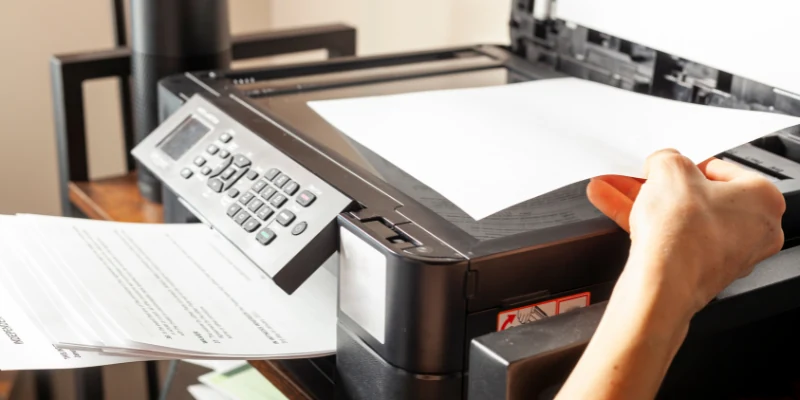Uses of Printers in Business Drive Success Every Day
Published: 11 Apr 2025
Did you know that 90% of businesses still rely on printers for their daily operations? From printing invoices to marketing materials, printers play a crucial role in keeping businesses running smoothly. Even in the digital age, companies across various industries depend on printed documents for efficiency and professionalism. Let’s explore the key uses of printers in business and why they remain essential today.
Office Documentation
Businesses rely on printers for essential paperwork like contracts, invoices, reports, and meeting notes. Having printed copies ensures compliance, legal security, and proper record-keeping. For example, a law firm prints legal agreements for clients to sign. Many companies also print internal reports for team discussions and presentations. While digital files are convenient, physical documents provide authenticity and easy accessibility in formal settings.
Marketing & Branding
Printed materials play a huge role in marketing and brand visibility. Businesses use printers to create brochures, posters, business cards, and flyers to promote their products or services. A local café, for instance, may print colorful flyers to advertise a new menu. Real estate agencies print high-quality property brochures to attract potential buyers. Even in the digital era, printed materials help businesses reach customers in a tangible and lasting way.

Retail & Billing
Retail businesses need printers for receipts, price tags, barcodes, and promotional signage. Stores use thermal receipt printers to quickly print customer bills at checkout counters. Clothing stores print barcode tags to track inventory and product details. Supermarkets print promotional posters and discount labels for shelves. These printed materials help streamline operations and improve customer experience in the retail sector.
Legal & Compliance
Many industries require printed legal documents, tax records, and policy agreements. Financial institutions, government offices, and corporate firms print essential compliance documents that must be stored physically. For example, an accounting firm prints annual tax reports and financial statements for auditing purposes. Hospitals print patient consent forms, ensuring proper legal documentation before medical procedures. Printers help maintain accuracy and accountability in professional settings.
Manufacturing & Logistics
Factories, warehouses, and shipping companies use printers to create shipping labels, inventory tags, and instruction manuals. A warehouse prints barcode labels to track stock levels efficiently. A manufacturing unit prints safety manuals for employees to follow procedures correctly. Logistics firms print detailed shipping labels and invoices to ensure smooth transportation and delivery of goods. These printed documents help businesses improve productivity and accuracy in supply chain management.

Healthcare Industry
Hospitals, clinics, and pharmacies require printers for printing patient records, prescriptions, and appointment slips. A doctor’s office prints medical reports for patients to carry to specialists. Pharmacies print medicine labels to ensure accurate dosages. Hospitals use printers to generate admission forms and discharge summaries, ensuring seamless communication between staff and patients. Having printed records helps in organizing patient history and delivering better healthcare services.
Education & Training
Schools, colleges, and corporate training programs frequently use printers for worksheets, exam papers, training manuals, and certificates. Teachers print study materials for students who prefer physical copies. Universities print admission forms and student ID cards for academic purposes. Businesses with employee training programs print guidelines and certificates for skill development. Printed materials remain crucial in educational and professional learning environments.
Hospitality & Events
Hotels, restaurants, and event planners use printers for menus, guest check-in sheets, event passes, and promotional banners. A hotel reception prints guest registration forms to maintain records. Restaurants print table menus and bills for dine-in customers. Concert organizers print entry tickets and VIP passes to manage attendees. These printed materials enhance customer experience and provide seamless service in the hospitality industry.
Many businesses still need printed documents for legal, financial, and customer-related purposes. Contracts, invoices, and receipts often require hard copies for record-keeping. Printed materials also improve branding, marketing, and operational efficiency.
A multifunction printer (MFP) is ideal for small businesses because it can print, scan, and copy in one device. Laser printers are great for fast, high-volume printing, while inkjet printers work well for color prints. Choose based on your printing needs and budget.
Businesses can save money by using duplex (double-sided) printing, printing in grayscale, and opting for refillable ink or toner cartridges. Digital alternatives like PDFs can also help reduce unnecessary printing. Investing in an energy-efficient printer can further cut costs in the long run.
Offices frequently print contracts, invoices, reports, employee manuals, and meeting notes. These documents are necessary for legal, financial, and administrative purposes. Printed copies ensure easy access, signatures, and official records.
Businesses use printers to create brochures, flyers, posters, and business cards for promotions. Printed materials help attract customers and provide a physical reminder of the brand. Even in digital marketing, print materials add a personal touch to advertising.
Yes, wireless printers allow multiple employees to print from different devices without needing cables. They improve efficiency in offices by enabling printing from laptops, tablets, and smartphones. However, businesses should ensure a secure Wi-Fi network to prevent unauthorized access.
Industries like retail, healthcare, legal, manufacturing, and education rely heavily on printers. They use them for receipts, patient records, contracts, training materials, and shipping labels. Despite digital advancements, printed documents remain essential in these fields.
Regular cleaning, using high-quality ink/toner, and avoiding overuse can extend a printer’s life. Keeping the printer in a dust-free environment and updating its software also helps. Businesses should schedule regular servicing to prevent breakdowns.
Inkjet printers use liquid ink and are great for high-quality color prints, making them ideal for marketing materials. Laser printers use toner powder and are faster, better for high-volume black-and-white printing. Businesses should choose based on their printing needs and budget.
While digital solutions are growing, going completely paperless isn’t always practical for all businesses. Some industries still require printed contracts, invoices, and compliance documents. A balanced approach, reducing unnecessary printing while keeping essential hard copies, is the best strategy.
Conclusion
So guys, in this article, we’ve covered Uses of Printer in Business in detail. While digital solutions are growing, printers continue to play a vital role in many industries. If you’re looking for reliability and cost-effectiveness, I highly recommend a laser printer for fast and high-quality printing. A good printer is an investment that can save your business time and money in the long run. Do you use printers in your workplace? Let us know how they help your business!

- Be Respectful
- Stay Relevant
- Stay Positive
- True Feedback
- Encourage Discussion
- Avoid Spamming
- No Fake News
- Don't Copy-Paste
- No Personal Attacks

- Be Respectful
- Stay Relevant
- Stay Positive
- True Feedback
- Encourage Discussion
- Avoid Spamming
- No Fake News
- Don't Copy-Paste
- No Personal Attacks
